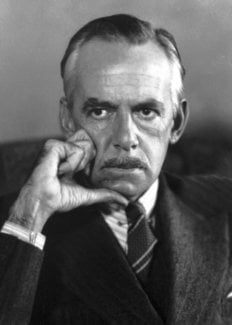Eugene O'Neill
Biographical

Born October 16th, 1888, in New York City. Son of James O’Neill, the popular romantic actor. First seven years of my life spent mostly in hotels and railroad trains, my mother accompanying my father on his tours of the United States, although she never was an actress, disliked the theatre, and held aloof from its people.
From the age of seven to thirteen attended Catholic schools. Then four years at a non-sectarian preparatory school, followed by one year (1906-1907) at Princeton University.
After expulsion from Princeton I led a restless, wandering life for several years, working at various occupations. Was secretary of a small mail order house in New York for a while, then went on a gold prospecting expedition in the wilds of Spanish Honduras. Found no gold but contracted malarial fever. Returned to the United States and worked for a time as assistant manager of a theatrical company on tour. After this, a period in which I went to sea, and also worked in Buenos Aires for the Westinghouse Electrical Co., Swift Packing Co., and Singer Sewing Machine Co. Never held a job long. Was either fired quickly or left quickly. Finished my experience as a sailor as able-bodied seaman on the American Line of transatlantic liners. After this, was an actor in vaudeville for a short time, and reporter on a small town newspaper. At the end of 1912 my health broke down and I spent six months in a tuberculosis sanatorium.
Began to write plays in the Fall of 1913. Wrote the one-act Bound East for Cardiff in the Spring of 1914. This is the only one of the plays written in this period which has any merit.
In the Fall of 1914, I entered Harvard University to attend the course in dramatic technique given by Professor George Baker. I left after one year and did not complete the course.
The Fall of 1916 marked the first production of a play of mine in New York – Bound East for Cardiff – which was on the opening bill of the Provincetown Players. In the next few years this theatre put on nearly all of my short plays, but it was not until 1920 that a long play Beyond the Horizon was produced in New York. It was given on Broadway by a commercial management – but, at first, only as a special matinee attraction with four afternoon performances a week. However, some of the critics praised the play and it was soon given a theatre for a regular run, and later on in the year was awarded the Pulitzer Prize. I received this prize again in 1922 for Anna Christie and for the third time in 1928 for Strange Interlude.
The following is a list of all my published and produced plays which are worth mentioning, with the year in which they were written:
Bound East for Cardiff (1914), Before Breakfast (1916), The Long Voyage Home (1917), In the Zone (1917), The Moon of the Carabbees (1917), Ile (1917), The Rope (1918), Beyond the Horizon (1918), The Dreamy Kid (1918), Where the Cross is Made (1918), The Straw (1919), Gold (1920), Anna Christie (1920), The Emperor Jones (1920), Different (1920), The First Man (1921), The Fountain (1921-22), The Hairy Ape (1921), Welded (1922), All God’s Chillun Got Wings (1923), Desire Under the Elms (1924), Marco Millions (1923-25), The Great God Brown (1925), Lazarus Laughed (1926), Strange Interlude (1926-27), Dynamo (1928), Mourning Becomes Electra (1929-31) , Ah, Wilderness (1932), Days Without End (1932-33).
Biographical note on Eugene O’Neill
After an active career of writing and supervising the New York productions of his own works, O’Neill (1888-1953) published only two new plays between 1934 and the time of his death. In The Iceman Cometh (1946), he exposed a «prophet’s» battle against the last pipedreams of a group of derelicts as another pipedream and managed to infuse into the «Lower Depths» atmosphere a sense of the tragic. A Moon for the Misbegotten (1952) contains a strong autobiographical content, which it shares with Long Day’s Journey into Night (posth. 1956), one of O’Neill’s most important works. The latter play, written, according to O’Neill, «in tears and blood… with deep pity and understanding and forgiveness for all the four haunted Tyrones», had its premiere at the Royal Dramatic Theatre in Stockholm. Sweden grew into an O’Neill centre with the first productions of the one-act play Hughie (posth. 1959) as well as A Touch of the Poet (posth. 1958) and an adapted version of More Stately Mansions (posth. 1962 ) – both plays being parts of an unfinished cycle in which O’Neill returned to his earlier attempts at making psychological analysis dramatically effective.
This autobiography/biography was written at the time of the award and first published in the book series Les Prix Nobel. It was later edited and republished in Nobel Lectures. To cite this document, always state the source as shown above.
Eugene O’Neill died on 27 November 1953.
The Nobel Foundation's copyright has expired.Nobel Prizes and laureates
Six prizes were awarded for achievements that have conferred the greatest benefit to humankind. The 14 laureates' work and discoveries range from quantum tunnelling to promoting democratic rights.
See them all presented here.
